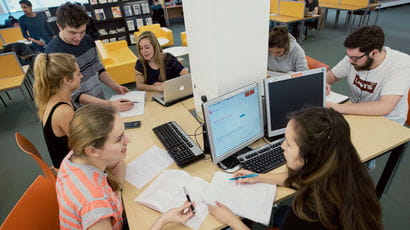Be a PAL Mentor
Reasons to take part
PAL Mentors play an important role in helping students to help themselves – whether students are brand new to the University or just in need of additional support to get the most of their UWE Bristol experience.
Becoming a PAL Mentor has many benefits:
- develop the soft skills employers look for through planning, organising, time management and relationship-building
- be equipped with mentoring and facilitation techniques
- connect with other students, which will help you form a community during your degree
- have the opportunity to attend a series of additional PAL events and conferences at UWE Bristol and externally
- receive payment in return for your work.
We truly value diversity and inclusivity at UWE Bristol and aim to be a university where all people can thrive, succeed, and belong.
In peer assisted learning (PAL) we particularly encourage applications from students who are likely to be under-represented. This includes students from Global Majority heritages, disabled students including neurodivergent students, mature students, LGBTQIA+ students, first in family to go to university students, parents, carers, and students who access UWE Cares.
We have a number of inclusive recruitment practices so please contact the PAL team at pal@uwe.ac.uk if you would like to discuss different formats for submitting your PAL Mentor application.
Role
The role of a PAL Mentor depends on the scheme you are applying for. It is important that you think at this stage about how you will manage your time to ensure that you are able to continue your role throughout the academic year, especially if you are enterring your final year.
Peer mentorship can happen on a weekly or fortnightly basis in timetabled group sessions, within taught workshops, open studio or lab sessions and during drop-ins in the autumn and spring semesters. Most PAL mentoring takes place in person on campus but there may be opportunities to offer virtual mentoring.
Your training will enable you to mentor Foundation and Year 1 students in small groups and one-on-one using your lived experience of a module, programme and university life to aid goal setting.
PAL Mentors use techniques to encourage collaborative learning in a relaxed and friendly environment aiming to help students to connect more with their course materials and peers, and boost their learning and study techniques. Within taught sessions led by lecturers, PAL Mentors support learning by circulating the room and mentoring students around process, experimentation and peer review of work. Mentors are not expected to teach, instruct or act as teaching assistants.
Eligibility
- You must have the right to work in the UK and be a current UWE Bristol student when applying to become a PAL Mentor and for the entire period of your employment (up to May 2026).
- Please do not apply if you are not based at Frenchay, Glenside or City Campus, or will be on your placement year working off-campus.
- You must be in the year above of the same undergraduate programme. We also welcome applications from higher level students including postgraduate students.
Qualities and skills required
We expect all PAL Mentors to demonstrate the following personal qualities, which will be assessed through the recruitment and selection process:
- empathy
- resilience
- enthusiasm
- reliability.
We are also looking for PAL Mentors who will be able to demonstrate all or most of the following skills:
- good listening and communication skills
- experience of supporting and helping others
- initiative and resourcefulness
- effective self-organisational and time management skills.
How to apply
Recruitment for our 2025-26 PAL Mentor roles is now open until Sunday 25 May 2025.
The online application form is currently open to students studying on specific courses, please view the PAL Mentor course list (PDF) to see if your course is included.
PAL Mentor job description (PDF)

"Becoming a PAL Mentor is about more than the added income or having some experience on your CV. It’s about having fun and making an impact with students who are going through the same thing you have just been through."
Max PAL Mentor
Training and support
Before starting your role, you will receive asynchronous training through online workbooks (normally in August) and synchronous training in person, on campus in early September, before term starts.
Please check the training dates on the application form before submitting your application, as attendance at this set training programme is mandatory.
PAL Coordinators
PAL Mentors are directly managed by the PAL Team and every PAL scheme has a dedicated PAL Coordinator who is a member of an academic team. PAL Coordinators support the specific scheme, providing ongoing advice and guidance to PAL Mentors about content as appropriate. Your initial expectations meeting with your PAL Coordinator will be scheduled before delivering your first session.
Senior PAL Mentors
You will also receive mentoring support from a dedicated Senior PAL Mentor who has previous experience in a PAL mentoring role. You will be observed by your Senior PAL Mentor at least once per semester to receive feedback on how to build your strengths and address areas for development.
Monthly group debriefs are led by your Senior PAL Mentor and give you the opportunity to share good practice, get ideas for how to improve your sessions from other Mentors and address any challenges.
Payment and hours
PAL Mentors are employed as casual workers by the University. The hourly rate is £12.60 per hour, plus holiday pay on the total hours worked per month.
PAL mentoring sessions are normally 60 minutes, which includes time allocated to complete your register and timesheet.
PAL Mentors receive a flat fee for training, which covers both the asynchronous and synchronous elements.
PAL Mentors are rewarded for session preparation, promotional activity and engagement with their Senior PAL Mentor and PAL Coordinator.
The hours of work are variable depending on the scheme. Typically, PAL Mentors can expect between one and three hours of sessions per week during term time.
You may also be interested in

Study skills
Support to help you study, including referencing, academic writing, research skills, time management, reading, plagiarism advice, and IT.

Health and wellbeing
Health and wellbeing services for students at the University.

Academic information
Advice on academic-related issues and what to do if something happens which affects your studies.
